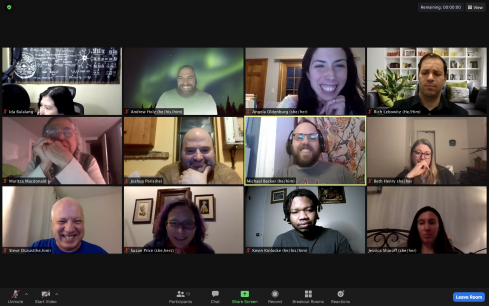
When MƒA Early Career Teachers Caity Tully (James Baldwin School, A School for Expeditionary Learning) and Jessica Sharoff (Washington Heights Expeditionary Learning School) made the shift to remote teaching last year, they assumed their upcoming MƒA mini course at the American Museum of Natural History (AMNH) would be postponed until it was safe to meet in-person again. However, Caity quickly found herself leaning into AMNH’s online resources as she planned new virtual lessons for her students.
“I typically bring my students to AMNH many times throughout the school year, so I believed the magic of the museum was physically located in the museum,” shared Caity. “After collaborating with the network of full-time educators at AMNH, they helped us create an inventory of all the virtual resources the museum had to offer, and we knew we had to share the materials with our MƒA peers.”

Caity and Jessica knew that many teachers felt frustrated that they have been unable to take their students on field trips or do meaningful fieldwork given the current teaching context. So this past spring, Caity and Jessica facilitated the MƒA mini course “A (Virtual) Night at the Museum” via Zoom to provide MƒA teachers with ways to do fieldwork even in the remote learning environment, including learning mechanisms that simultaneously engage students and demonstrate the nature of science.
Participants developed virtual fieldwork using AMNH online resources and exhibits, including the use of museum tools like Google Arts and Culture, Virtual Tours, Science Bulletins, and Ology to sample AMNH lessons that use digital resources and examine how these resources can strengthen remote curriculum. The two-session course also centered around physical science halls like the Hall of Planet Earth, Hall of Ocean Life, Rose Center for Earth and Space, and Fossil Halls. Together, teachers explored the different tools and methods, discussed ways they could implement them into their teaching based on subject area and interest, and planned how to modify lessons to fit the needs and interests of their students.
“Right now, it’s important that we help support each other with best practices and sharing innovative ideas, especially since no one has taught like this before.These virtual MƒA courses will help increase access to more wonderful PD opportunities in the future.”
- MƒA Early Career Teacher Jessica Sharoff
Caity added, “I’m hoping that getting these resources into other teachers’ hands will help spread that love I have of informal science education, encourage young people to question the workings of the natural world around them, and capitalize upon all that NYC has to offer - even when the physical doors are temporarily closed.”
Read more about MƒA’s efforts to support teachers during remote learning in a previous workshop spotlight.